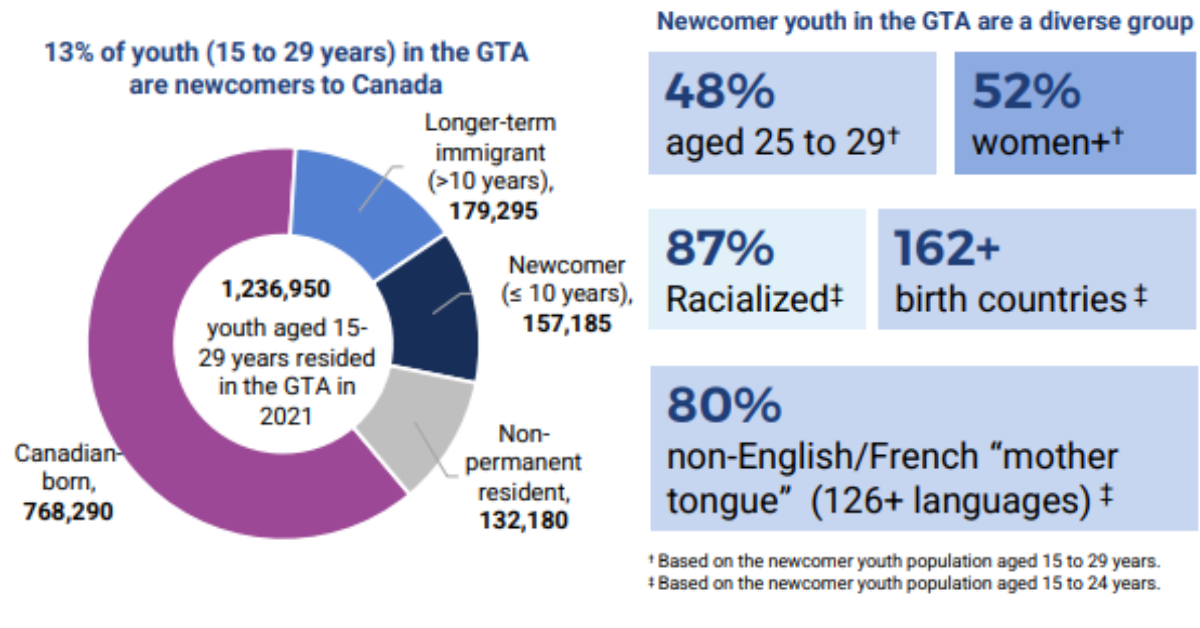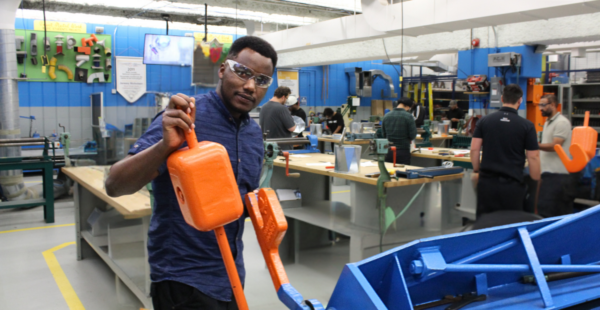Newcomer youth arriving in Canada aren’t able to use their skills and talents to the fullest; a missed opportunity for both newcomers and the Canadian economy, according to a research report led in part by WoodGreen Community Services.
“Although newcomer youth possess many strengths and skills for employment, they have a lower employment rate than youth born in Canada and earn less despite high levels of education,” cites the report Hidden Talent: Unlocking the Employment Potential of Newcomer Youth in the Toronto Region.
Funded by Immigration, Refugees and Citizenship Canada (IRCC) through the Youth Employment and Skills Strategy (YESS) program, the project team included members from Toronto Region Immigrant Employment Council (TRIEC), JVS Toronto (JVS) and WoodGreen.
♦READ THE REPORT HERE♦
Farzana Propa says WoodGreen was very keen to participate in the research project. She is the study’s Research and Evaluation Coordinator, a role she also holds within WoodGreen’s Workforce Development program.
“Youth and the Future of Work are two pillars in WoodGreen’s strategic plan,” she says. “This project gave us the unique opportunity to better understand what’s working well within employment service organizations and which practices can be adopted to best serve newcomer youth.”

Who are Toronto’s newcomer youth?
In Spring 2023, researchers set about finding the reasons why newcomer youth in Canada are lagging behind others in career success. That first meant defining who makes up Toronto’s newcomer youth. Researchers focused on people aged 15 to 29 who had arrived in Canada within the last ten years. That group makes up more than one in ten (13%) of all young Torontonians. This group is incredibly diverse; born in 162 countries with the vast majority (80%) of young newcomers having neither English nor French as a mother tongue.
Researchers started with a youth employment survey of 2,300 young people, then held more than two dozen focus groups specifically with newcomer youth. This was followed by surveying 240 hiring managers and then interviews with representatives of 37 service organizations. Finally, researchers then gathered 51 young people for three workshops to dig deep into their experiences with 1) pre-employment 2) job search and entry 3) retention and career advancement. Participants represented a broad spectrum of experience. They included people from all over the world. Some had arrived as refugees or international students, others came as sponsored immigrants or temporary foreign workers. Some were in school for a while, some were working while about half were actively searching for a job. Their education ranged from middle school to Bachelor’s Degrees or higher.
While WoodGreen recruited participants, it also engaged eight newcomer youth to help with the research. “We trained them on basic interviewing techniques and ran four workshops to teach them community-based research methods (a method that involves researching with, and not on, members of a community”, explains Propa.
“Involving newcomer youth in this way led to a richer understanding of their labour market realities and better-informed the recommendations in the report,” she said.

Pre-Employment
Researchers initially looked at how young newcomers got ready to enter the working world in Canada, including exploring career choices and gaining education, skills training, and experience.
They found newcomer youth lack supports to help guide them in making career choices, such as mentors, career coaches or training. Despite this, most youth had clear career interests and goals and viewed their international experience as an asset to the Canadian workforce.
Most newcomers felt confident in their workplace skills, however, employers surveyed were less optimistic. “Surveyed hiring managers had concerns about newcomer youth applicants’ possible lack of soft skills, English language skills and familiarity with Canadian business culture, practices and norms,” states the report.
Younger participants were more hopeful about their future employment prospects, while the older cohort expressed frustration over preparing for employment, including difficulties in having credentials recognized and a lack of knowledge about employment-related programs and services.
Job Search and Entry
When it came to looking for a job, many newcomers said they struggled with employers devaluing their non-Canadian work experience, an effect widely known as the “Canadian experience barrier”. Many participants spoke about the stigmatization they face during job searches on the basis of factors such as their foreign-sounding names, their race or ethnicity.
However, when asked, the majority of employers said they want to improve their newcomer youth recruitment and retention practices.
Another challenge newcomer youth report is their limited professional networks, which prevent their access to the “hidden job market” and make it difficult to obtain references. Very few participants had accessed employment services and those who did found that, while they helped with resume and interview preparation, networking events too often focused only on entry-level jobs in a field. The study also found that newcomer youth rely heavily on online job searches.

Building a Career
Researchers also wanted to learn how newcomer youth fare when it comes to building a career after gaining employment. The report finds that newcomer “youth may not feel a sense of belonging in their work environments. While both surveyed Canadian-born and newcomer youth reported experiencing discrimination at work because of their ethnicity, race or culture, newcomer youth had also been discriminated for their language or accent.”
The study also reports newcomer youth often find themselves in lower-quality jobs compared to their Canadian-born counterparts, highlighting the fact that there are few programs designed to support job retention and career advancement for newcomer youth.
Findings provide crucial insight
Some of the results surprised the team, says Propa, and ultimately gave service providers like WoodGreen an insight into gaps in the system. “While many Toronto organizations provide employment services for newcomer youth, they’re not reaching out to the youth that perhaps need them most,” she says, pointing to newcomer youth living in temporary shelters as an example.
Better support for newcomer youth
The final goal of the project was to determine how decision-makers could use the results to make changes to better help newcomer youth.
The report made 21 recommendations across the three focus areas. Some of the key recommendations included:
- Providing newcomers with information about employment services directly upon arrival
- Providing better mentorship opportunities for youth
- Providing more support during the hiring process
- Enhancing community outreach to spread awareness about services
- Improve connections between organizations offering newcomer services
- Increase public and employer awareness of strengths/challenges of newcomer youth
- Expand options for validating international credentials
- Provide newcomers with information and connections on worker rights
- Offer employer incentives to hire newcomer youth
- Require employers to have dedicated placements for newcomer youth
WoodGreen leads change
Propa says WoodGreen is well positioned to take on a leadership role when it comes to advocating for newcomer youth. “As an agency, we can work towards helping bring down systemic barriers such as employers looking for Canadian work experience or Canadian degrees,” she says.
The report concludes that if organizations adopt the report’s recommendations, it will “become a great opportunity to realize the full potential of an underserved but important segment of the Canadian workforce.”
The findings from Hidden Talent: Unlocking the Employment Potential of Newcomer Youth in the Toronto Region have already been used by WoodGreen’s Community Program Unit to help inform and design upcoming programs within Youth Services, Newcomer Services and Workforce Development.
⇒Learn more about our work with Newcomers here.
⇒See how we’re working with Toronto youth here.





